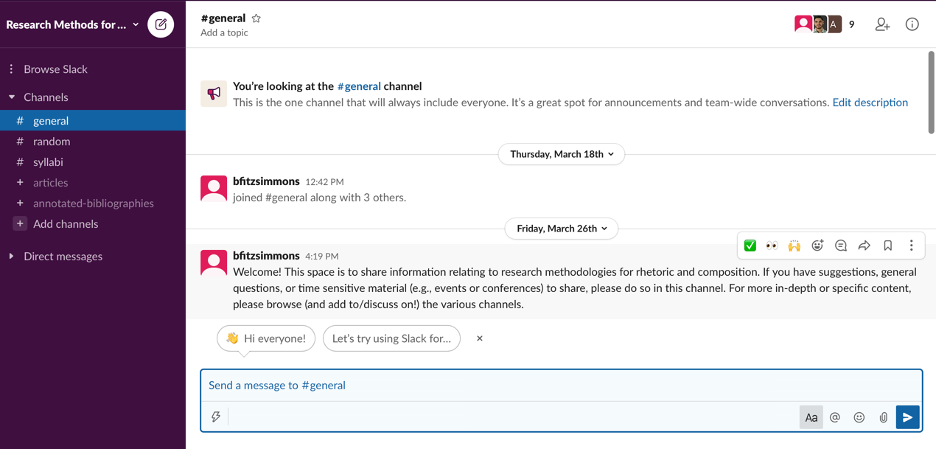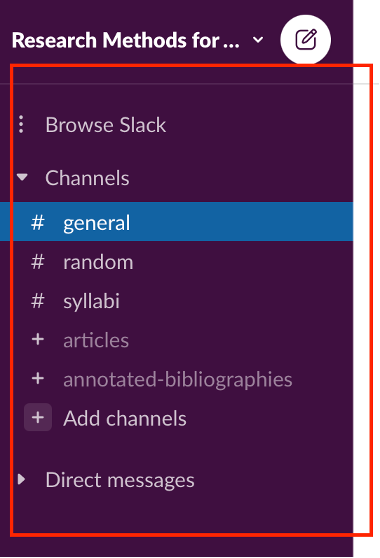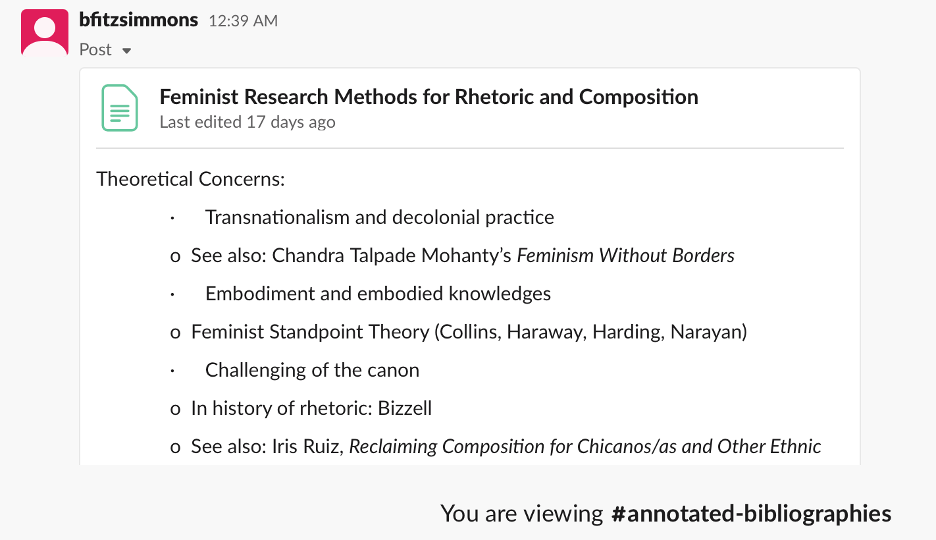Speakers: Brynn Fitzsimmons, Sarah Kugler, Yee-Lum Mak, Faith Scheidemantle, and Pritha Prasad (respondent) (all affiliated with the University of Kansas)
Overview
A commonplace of graduate students is that we are crafty—and we’re even craftier when we work together. This truism underpins the project that the panelists of Developing a Digital Commonplace for Research Methods in a COVID Climate presented during their talk: a born-digital repository of resources pertinent to research methods and methodology born from identified need in response to COVID-19. As the panelists stated plainly, graduate students have contended with shifting research scapes and approaches given the isolation of current social and academic protocol because of COVID-19. The repository the panelists offer—which is a space created via popular communications platform Slack—thus serves as a community-oriented solution to these limitations, operating on open input and platform affordability.

Identifying Need: Graduate Research Methods Training and COVID-19
The session began with reflection on how the need for the repository was identified. At the beginning of the COVID-19 Pandemic, as courses were reconfigured or cut, graduate students Yee-Lum Mak, Sarah Kugler, Faith Scheidemantle, and Brynn Fitzsimmons reflected on their own needs as students and emerging researchers. For them, looming exams, a prospectus, and a dissertation highlighted the training needed to conduct research within rhetoric and composition—as well as how unprepared they felt. Fitzsimmons noted that she struggled with learning and practicing methods amid the pandemic, which made difficult exploring dissertation topics and orienting herself to research trends as a new scholar. Mak echoed this need given that, because of COVID-19, she had limited options for research relevant to the emergent strands of her dissertation topic. Kugler and Scheidemantle both added similar reflections.
All panelists noted that they had taken to other departments for research methods training beyond a rhetoric and composition course (to no fault of their own or the program as graduate faculty, as panel respondent Pritha Prasad noted toward the end of the session). These courses ranged from feminist methods in a women and gender studies program, a methods course in a linguistics and anthropology department, and a course on ethnography. Together, the graduate student panelists highlighted the constellative, interdisciplinary nature core to much of rhetoric and composition research. After they had come together to talk, Scheidemantle noted that they realized they could work together to resolve the tensions they were experiencing—and they also decided to make it more public facing to possibly help other graduate students experiencing the same issue.
Creating the Repository: Planning and Features
After identifying the need for ongoing training and a broader purview of methods, the graduate students noted that they initially worked together to search out resources relevant to rhetoric and composition research methods. Through searches, they were able to accrue syllabi with key readings, projects, and more, and from there, Scheidemantle noted, they worked to parse out salient takeaways from their collection. After, as Mak noted, the panelists decided to make the repository public-facing given that, if they were going through issues with training, they were certain other graduate students might be dealing with the same COVID-related interruptions in professionalization.

The panelists noted that they decided to use Slack given its structural utility (i.e., file storage, channel-based system, and annotation capabilities). Using Slack, they created a workspace with five distinct channels: Figure 1 This screenshot shows a list of channels, “General,” Random,” Syllabi,” Articles,” and “Annotated Bibliographies.” From that moment, the panelists used the session to showcase the different channels of Slack workspace. Of particular note was the “Annotated Bibliographies” channel. Kugler stated that each person selected some topics and wrote annotations with each of the texts, framing their importance within broader research practices in rhetoric and composition.
As Mak highlighted, they see the “Annotated Bibliographies” channel as a useful space for highlighting prime examples of different kinds of research, ranging from engaging in human-subjects research to setting up small case studies. Through the repository itself is relatively fresh, the panelists showcased several extant annotated bibliographies, including ones titled “Introductory Texts for Research Methods,” “Feminist Research Methods for Rhetoric and Composition,” “Rhetoric of Health and Medicine,” “Quantitative and Computer-Assisted Methods,” and “Discourse Analysis.” The breadth of their work is quite expansive—and impressive—and will undoubtedly assist many others given ongoing trends withing writing and rhetoric studies writ large.

Beyond the “Annotated Bibliographies” channel, several other channels also showcase the panelists thoughtful approach to compiling resources for other graduate students. Perhaps as notable as the written bibliographies is the curation of syllabi from various universities, writing and rhetoric programs, and rhetoric and composition programs. The collection of syllabi thus far comprises entries from universities such as George Mason University, Michigan State University, James Madison University, University of Washington, among others. Together, the syllabi also offer a rich corpus of readings that any graduate student would find useful for perusing as they think through their own methodologies, projects, and training. This resource is really quite invaluable.
Takeaways
To conclude, Mak noted that much of what graduate students learn regarding methods in rhetoric and composition comes from the “genealogy” of how the field reaches out across other disciplines and traditions, such as the social sciences. As such, the panelists concluded by extending an offer for other graduate students to join in the repository and to contribute their own perspectives to the growing collection. Fitzsimmons stated that they ask those who join to situate their research and connect their own entries to rhetoric and composition, which responds to their own work of connecting extra-discipline methods to the field. To help do that, Mak spotlighted a series of questions—which are pinned posts in each respective channel—that will help newcomers to do this situational work. The panelists stressed that this repository is a collection of living documents—it is a starting point for generating more resources for more graduate students. Their wish is for the repository to grow to encompass the needs of graduate students in the foreseeable future.
That said, when prompted by an audience question, the panelists noted they are still resolving lingering issues related to platform sustainability, especially with the matriculation endemic to the graduate student experience. They highlighted Slack’s utility regarding having newcomers enter into the repository—which also makes possible collaboration and troubleshooting as users can quite easily pose questions. However, given that users would be essentially sharing their and others’ works (i.e., syllabi and articles), another question posed asked about the possibility of a Creative Commons license or a pivoting to a Wikipedia style format. The panelists noted that these are important considerations, and they will work to resolve them in the future. But for now, this repository stands as an incredibly useful resource for graduate students within writing and rhetoric studies. This reviewer, for one, is excited to see where it grows from here.
The panelists offered the document below for those interested in joining the Slack repository: Instructions for Joining the Research Methods for Rhetoric and Composition Slack
